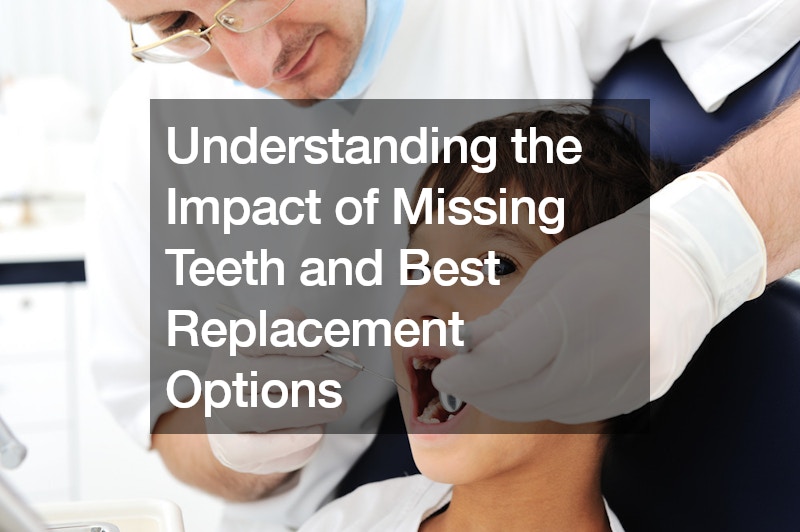
Disclaimer: This website provides health information for educational purposes only and is not a substitute for professional medical advice, diagnosis, or treatment. Always seek the guidance of a qualified healthcare provider with any questions you may have.
Missing teeth can have a significant impact on both oral health and overall well-being. When a tooth is lost, whether due to decay, injury, or extraction, it can lead to various complications if not addressed promptly. From aesthetic concerns to functional limitations and potential health risks, the consequences of leaving gaps in the dental arch extend beyond mere inconvenience.
One of the primary concerns associated with missing teeth is bone loss. When a tooth is lost, the underlying bone no longer receives the stimulation it needs to maintain its density and volume.
Over time, this can result in resorption, where the bone begins to deteriorate. As the bone diminishes, neighboring teeth may shift out of alignment, leading to bite problems and potential jaw joint issues.
Additionally, missing teeth can affect chewing and speaking abilities, impacting one’s dietary choices and nutritional intake. This can have long-term consequences for overall health and well-being, potentially increasing the risk of malnutrition and systemic health conditions.
While it may be tempting to ignore a missing tooth, especially if it’s not immediately visible or causing discomfort, addressing the issue promptly is crucial. Fortunately, there are several replacement options available to restore both function and aesthetics to the smile.
Partial dentures are a traditional option for replacing missing teeth. These removable appliances can fill in gaps in the dental arch, improving chewing ability and restoring a more natural appearance. However, partial dentures may contribute to bone loss over time and require regular maintenance.
Another option is a dental bridge, which consists of one or more artificial teeth anchored to adjacent natural teeth. While bridges can effectively replace missing teeth, they require the preparation of healthy teeth for crowns, which may not be ideal in every case. Additionally, bridges do not address underlying bone loss and may need to be replaced over time.
Dental implants have emerged as the gold standard for tooth replacement due to their durability, stability, and ability to mimic natural teeth closely. Unlike dentures and bridges, which sit on the gumline or rely on neighboring teeth for support, dental implants are surgically placed into the jawbone, where they integrate and become a permanent part of the oral anatomy.
By replacing the missing tooth root, dental implants provide stimulation to the underlying bone, helping to prevent bone loss and preserve jaw structure. This not only maintains facial aesthetics but also ensures optimal function and long-term oral health. With proper care, dental implants can last a lifetime, making them a cost-effective solution in the long run.
However, not everyone may be a candidate for dental implants. Factors such as bone density, overall health, and lifestyle habits may impact eligibility. In some cases, preliminary procedures such as bone grafting may be necessary to enhance bone volume and support implant placement.
Before undergoing any tooth replacement procedure, it’s essential to consult with a qualified dental professional. A comprehensive evaluation, including a thorough examination and diagnostic imaging, will help determine the most suitable treatment plan based on individual needs and circumstances.
At the dental clinic, experienced practitioners can assess eligibility for dental implants and discuss alternative options if necessary. Whether it’s partial dentures, bridges, or implants, the goal is to restore function, aesthetics, and oral health for improved quality of life.
In addition to exploring replacement options, preventive dental care plays a crucial role in maintaining a healthy smile and reducing the risk of tooth loss. Regular dental check-ups, professional cleanings, and good oral hygiene practices can help prevent decay, gum disease, and other issues that may lead to tooth loss.
Moreover, the psychological impact of missing teeth cannot be overlooked. Individuals with noticeable gaps in their smile may experience a decline in self-esteem and confidence. Restoring a complete and healthy smile through tooth replacement can positively impact one’s mental well-being and social interactions.
It’s also important to consider the financial aspect when evaluating tooth replacement options. While dental implants may have a higher upfront cost, their long-term durability and minimal maintenance requirements can make them a cost-effective choice over time. Partial dentures and bridges, on the other hand, may incur ongoing expenses for adjustments and replacements.
Furthermore, the age factor can influence the choice of tooth replacement. Younger individuals may benefit more from dental implants, as they offer a long-term solution with minimal impact on adjacent teeth. Older individuals, however, may find traditional options like dentures or bridges more suitable, especially if bone density or overall health concerns limit their eligibility for implants.
In conclusion, understanding the impact of missing teeth and exploring the best replacement options is essential for preserving oral health and overall well-being. By addressing tooth loss promptly and choosing the most appropriate treatment, individuals can enjoy a confident smile and optimal oral function for years to come. Consultation with a dental professional, regular preventive care, and consideration of individual factors such as age and financial considerations are crucial steps in the journey towards a healthy and complete smile.
.
